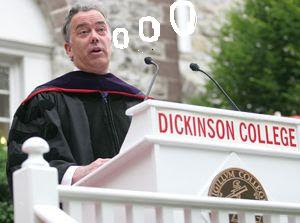Movie's Darwin-to-Hitler theme and the ADL
The ADL has --
.
(1) -- called the Kitzmiller v. Dover decision a "victory for students." [1]
(2) -- had that crackpot Judge Jones as a guest speaker at a national executive committee meeting.[2]
(3) -- submitted an amicus brief supporting the plaintiffs/appellees in the Selman v. Cobb County evolution-disclaimer textbook sticker case and gave an "Unsung Hero Award" to lead plaintiff Jeffrey Selman.[3]
(4) -- called students "the real winners" in the Great Cobb County Cop-out, where the Cobb County school board took a dive by settling out of court with the plaintiffs even though the school board was ahead (the district court decision was vacated and remanded because of missing evidence and the appeals court judges indicated at an oral hearing that they were leaning towards reversal).[4]
(5) -- condemned the Darwin-to-Hitler "Darwin's Deadly Legacy" TV show produced by Coral Ridge Ministries.[5]
(6) -- While condemning linkage of Social Darwinism to the holocaust, the hypocritical ADL has no qualms about linking "Christian antisemitic ideology" to the holocaust.[6]
(7) -- filed an amicus brief in Edwards v. Aguillard 482 U.S. 578, 580 (1987), showing that ADL opposition to criticisms of Darwinism is not new (the American Jewish Congress filed a separate amicus brief).[7]
=========================================
What in the hell does the evolution controversy got to do with anti-semitism? Ironically, orthodox Jews tend to be some of the biggest supporters of creationism and Intelligent Design.[8][9][10][11]
.
Labels: Darwin-to-HItler (new #1)
READ MORE






